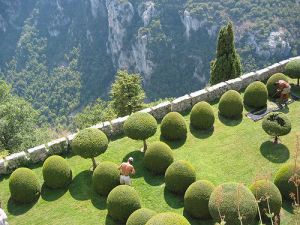November 2010 - Vol. 44
The madness of
modern sophists
On the day that any copybook maxim is carried out there will be something
like an earthquake on the earth. There is only one thing new that can be
done under the sun; and that is to look at the sun. If you attempt it on
a blue day in June, you will know why men do not look straight at their
ideals. There is only one really startling thing to be done with the ideal,
and that is to do it. It is to face the flaming logical fact, and its frightful
consequences.
Christ knew that it would be a more stunning thunderbolt to fulfill the law than to destroy it. It is true of both the cases I have quoted, and of every case. The pagans had always adored purity: Athena, Artemis, Vesta. It was when the virgin martyrs began defiantly to practice purity that they rent them with wild beasts, and rolled them on red-hot coals. The world had always loved the notion of the poor man uppermost; it can be proved by every legend from Cinderella to Whittington, by every poem from the Magnificat to the Marseillaise. The kings went mad against France not because she idealized this ideal, but because she realized it. Joseph of Austria and Catherine of Russia quite agreed that the people should rule; what horrified them was that the people did. The French Revolution, therefore, is the type of all true revolutions, because its ideal is as old as the Old Adam, but its fulfillment almost as fresh, as miraculous, and as new as the New Jerusalem. But in the modern world we are primarily confronted with the extraordinary spectacle of people turning to new ideals because they have not tried the old. Men have not got tired of Christianity; they have never found enough Christianity to get tired of. Men have never wearied of political justice; they have wearied of waiting for it. The principle
of domesticity
Hacking a sonnet
out of a rock
Man's pleasure, therefore, is to possess conditions, but also to be partly possessed by them; to be half-controlled by the flute he plays or by the field he digs. The excitement is to get the utmost out of given conditions; the conditions will stretch, but not indefinitely. A man can write an immortal sonnet on an old envelope, or hack a hero out of a lump of rock. But hacking a sonnet out of a rock would be a laborious business, and making a hero out of an envelope is almost out of the sphere of practical politics. The idea of artistic
expression
The average man cannot cut clay into the shape of a man; but he can cut earth into the shape of a garden; and though he arranges it with red geraniums and blue potatoes in alternate straight lines, he is still an artist; because he has chosen. The average man cannot paint the sunset whose colors he admires; but he can paint his own house with what color he chooses, and though he paints it pea green with pink spots, he is still an artist; because that is his choice. Property is merely the art of the democracy. It means that every man should have something that he can shape in his own image, as he is shaped in the image of heaven. But because he is not God, but only a graven image of God, his self-expression must deal with limits; properly with limits that are strict and even small. I am well aware that the word “property” has been defied in our time by the corruption of the great capitalists. One would think, to hear people talk, that the Rothchilds and the Rockefellers were on the side of property. But obviously they are the enemies of property; because they are enemies of their own limitations. They do not want their own land; but other people's. When they remove their neighbor's landmark, they also remove their own. A man who loves a little triangular field ought to love it because it is triangular; anyone who destroys the shape, by giving him more land, is a thief who has stolen a triangle. A man with the true poetry of possession wishes to see the wall where his garden meets Smith's garden; the hedge where his farm touches Brown's. He cannot see the shape of his own land unless he sees the edges of his neighbor's. It is the negation of property that the Duke of Sutherland should have all the farms in one estate; just as it would be the negation of marriage if he had all our wives in one harem. [excerpted from the book, What’s
Wrong with the World, Chapter 6, by G.K. Chesterton]
|
. | ||||
|
publishing address: Park Royal Business Centre, 9-17 Park Royal Road, Suite 108, London NW10 7LQ, United Kingdom email: living.bulwark@yahoo.com |
. |
 .
.
